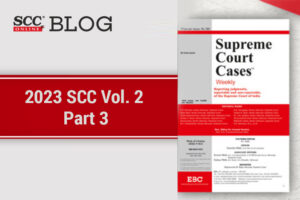Arbitration and Conciliation Act, 1996 — Ss. 11, 8 and 16 — Arbitrability — Accord and Satisfaction — Plea of claims being barred by accord and satisfaction: Though the aspect with regard to “accord and satisfaction” of the claims may/can be considered by the Court at the stage of deciding S. 11 application, held, it is always advisable and appropriate that in cases of debatable and disputable facts, good reasonably arguable case, the same should be left to the Arbitral Tribunal. [Indian Oil Corpn. Ltd. v. NCC Ltd., (2023) 2 SCC 539]
Arbitration and Conciliation Act, 1996 — Ss. 34 to 36 r/w Arbitration Act, 1940: In this case, there was pendency of execution petitions in various districts in State of U.P., for execution of arbitral awards. Directions were issued to High Court to prepare a road map and to take a call as to how problem of pendency of execution petitions/applications to execute awards passed under 1940 Act and 1996 Act and applications under S. 34 are decided/disposed of at earliest, so that ultimate object and purpose of Arbitration Act and Commercial Courts Act is achieved. [Chopra Fabricators & Manufacturers (P) Ltd. v. Bharat Pumps & Compressors Ltd., (2023) 2 SCC 481]
Central Excise Act, 1944 — S. 4: Ambit of valuation of excisable goods and meaning of value and valuation, explained. [CCE & Service Tax v. Merino Panel Product Ltd., (2023) 2 SCC 597]
Civil Procedure Code, 1908 — Or. 22 Rr. 3, 4 and 11, Or. 39 and Or. 43 R. 1(r) — Death of party and bringing of LRs on record: If the legal representatives are brought on record within the prescribed time at one stage of the suit, including at interlocutory/interim stage, it will enure for the benefit of all the subsequent stages of the suit. Consequently, main suit would not stand abated. [Maringmei Acham v. M. Maringmei Khuripou, (2023) 2 SCC 473]
Contract and Specific Relief — Remedies/Relief — Restitutionary Remedies — Contractual Restitution Clause/Contractual quantum meruit or valebant: Applicability of Contractual Restitution Clause and binding effect of allocation of risk of change in law by the contract, explained. [Uttar Haryana Bijli Vitran Nigam Ltd. v. Adani Power (Mundra) Ltd., (2023) 2 SCC 624]
Criminal Procedure Code, 1973 — S. 439 — Bail: Bail granted by considering period of custody, submission of charge-sheet and nature of evidence being documentary/electronic. [Ratnambar Kaushik v. Union of India, (2023) 2 SCC 621]
Criminal Procedure Code, 1973 — Ss. 211, 212, 213 and Ill. (e) thereto, 215, 313 and 464: Principles clarified regarding effect of omission to frame proper charge and to put relevant circumstances to accused during their examination under S. 313 (in a murder case) and applicability of Ill. (e) of S. 213 CrPC. [Kalicharan v. State of U.P., (2023) 2 SCC 583]
Education Law — Fees — Fee structure/Capitation Fee/Fee Regulatory Committee — Fee fixation — Power of: Enhancement of tuition fees by State Government while revision of fees pending consideration with Admission and Fee Regulatory Committee (AFRC), held, illegal under the regime in place under the Andhra Pradesh Educational Institutions (Regulation of Admission and Prohibition of Capitation Fee) Act, 1983 (5 of 1983) and the Andhra Pradesh Admission and Fee Regulatory Committee (for Professional Courses offered in Private Unaided Professional Institutions) Rules, 2006. [Narayana Medical College v. State of A.P., (2023) 2 SCC 636]
GST — Taxable Territory/Place of Supply — Determination of — Location of supplier and location of recipient — Relevance of: Services rendered by Haj Group Organisers (HGOs)/private tour operators (PTOs) to Haj pilgrims for pilgrimage in Kingdom of Saudi Arabia undertaken from India if can be considered, as services rendered in taxable territory exigible to tax, determined. Relevance of location of service provider and service recipient, explained. [All India Haj Umrah Tour Organisers Assn. v. Union of India, (2023) 2 SCC 484]
Insolvency and Bankruptcy Code, 2016 — Ss. 238-A, 7 and 9 r/w Art. 137 of the Limitation Act — Limitation period for initiation of CIRP: For the purpose of limitation, the relevant date is the date on which the right to sue accrues which is the date when a default occurs. Further, the fact that an application for initiation of CIRP, may have been filed within three years from the date of enforcement of the relevant provisions of IBC is inconsequential and what is material is the date on which the right to sue accrues, and whether the cause of action continuous. [Tech Sharp Engineers (P) Ltd. v. Sanghvi Movers Ltd., (2023) 2 SCC 531]

